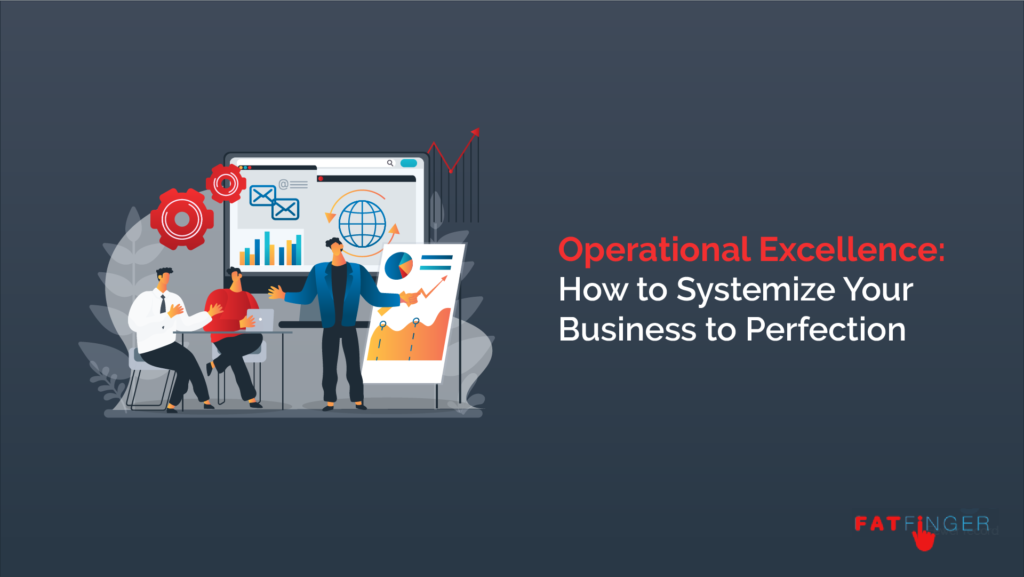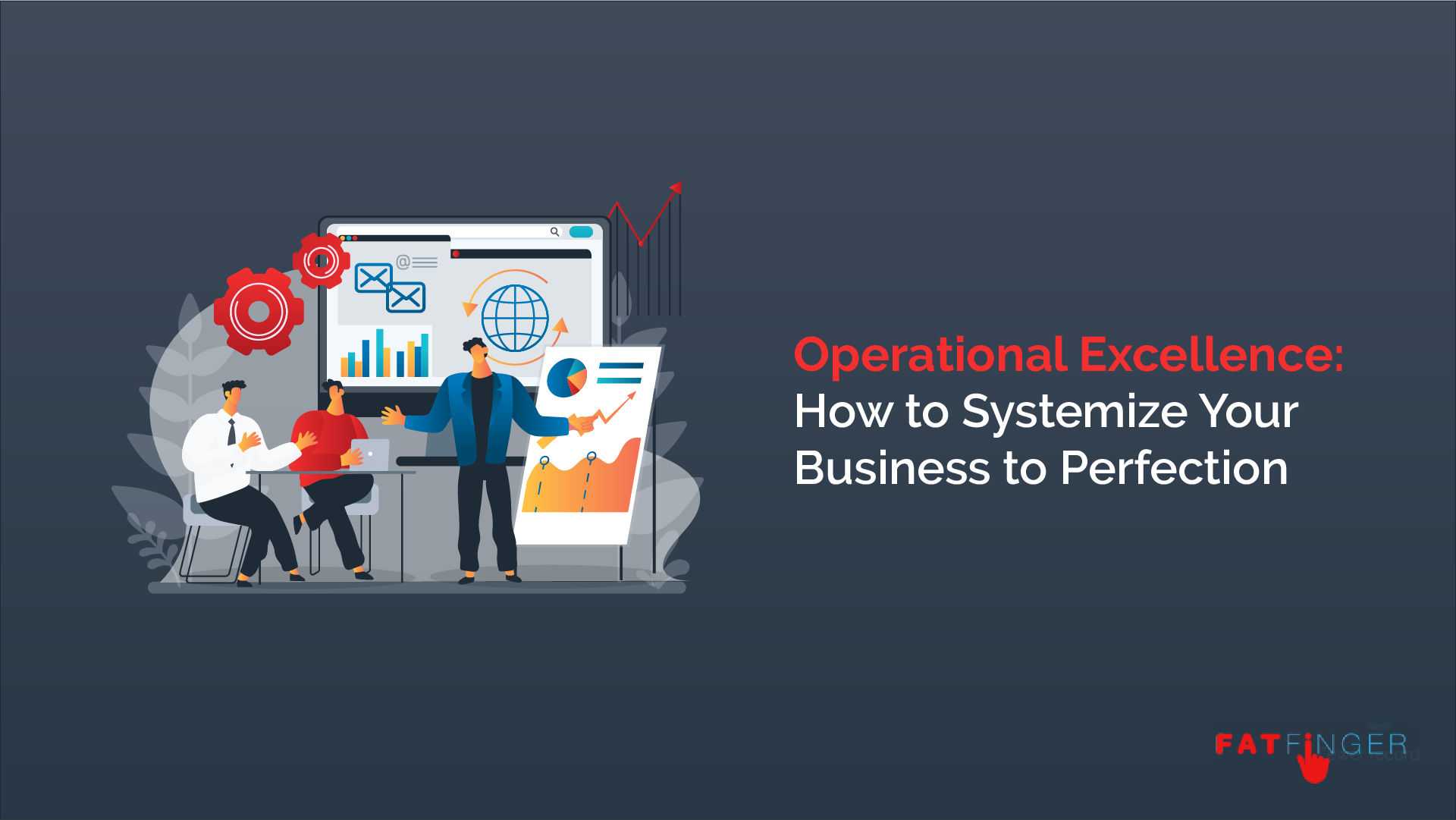
What would happen if you upheld every New Year’s resolution you’ve ever made?
Every year we make ourselves promise to exercise more, eat healthier, learn a new instrument, and so on. If we always improved in these ways, our productivity would skyrocket while we lead healthier and immensely happier lives.
Apply that logic to your business, and you have the theory of operational excellence.
Do you want to run a business that’s always improving and eliminating inefficiency, while also producing high-quality products at a fraction of the potential cost?
Well, that’s why this post will tell you everything you need to know about what operational excellence is, what the path to it looks like, and how to achieve it for yourself.
In this post I’ll cover:
- What is operational excellence?
- Why is operational excellence important?
- The importance of company culture
- The core principles of operational excellence
- How to achieve operational excellence
Let’s get started.
What is operational excellence?

“Operational excellence” is a term mired in buzzwords and conflicting definitions. While some academic papers exist on the topic (which themselves admit how vague the term can be), much more exists that is informal and conflicting at best.
As such, to understand operational excellence we first need to define it.
Operational excellence is a state in which a business’ output is maximized while reducing the inputs required to achieve those results.
Your “outputs” can be anything from pure profits to customer satisfaction. Whatever your company chooses to prioritize or is a primary success metric of their products/services can be an “output”.
“Operational excellence in simple words is organizations making improvements to attain a competitive advantage. Modern day organizations not only maximize the benefits for the organizations, but also the customer and other stakeholder’s needs are taken care.“
Michael Sony, Implementing sustainable operational excellence in organizations: an integrative viewpoint, Production & Manufacturing Research, 7:1, 67-87, DOI: 10.1080/21693277.2019.1581674
The key here is to not confuse operational excellence with the pursuit of such a state of business. That’s well and truly covered by continuous improvement.
Instead, it’s the state that is achieved when practices such as continuous improvement are completely merged into a company’s culture.
If your company achieves operational excellence, the methods supporting it are already baked in.
You’d usually achieve this through a focus on documenting, improving, and enforcing the processes your company runs on.
The key is for you to design every process to achieve a single goal. This will let your team achieve that goal no matter how inexperienced they are.
Why is operational excellence important?
“Operational excellence enables an organization to do more with the same staff through better employee engagement and streamlined processes. It is not about cutting resources, but rather about figuring out together how we can better apply our resources.“
Sergei Brovkin, Operational Excellence: A powerful optimisation & growth strategy for the COO
Operational excellence is the dream of any and every company that exists to make money. Unless you’re a charity, this is goal you’re working towards.
Here at FAT FINGER we’ve previously mentioned how companies typically lose 20-30% of their revenue every year due to inefficiencies. Being operationally excellent means that you’ve eliminated those inefficiencies without also suffering in other fields.
We’ve also covered how a culture of continuous improvement (through Kaizen) revolutionized the Japanese business world post-WWII.
This is the precursor to operational excellence. Through continuous improvement and perfecting your practices, you can gain a competitive edge.
The bakery example

For example, let’s say that you run a bakery. You have several popular products, but the runaway success is your apple pies.
The pies are tasty and customers are happy, but your old AGA is slow to cook them. So, when you see an ad for a big electric oven and rush to buy it. It’ll let you bake more pies because they’ll cook faster and in larger batches.
You’re solving an inefficiency. That’s good, right?
The problem only hits home once your customers stop coming back.
You didn’t stop to think that the long baking time gave them an edge on the competition.
In other words, your customer satisfaction due to the faster cooking process. You solved one problem, but didn’t have the foresight to see whether this would create another.
This isn’t operational excellence. If it were, you would have asked your core customers what they liked about your pies and why they kept coming back. You might have realized that the unique flavor of a slow-cooked pie was core to your brand, and thus solved the problem in another way.
Perhaps you’d buy another AGA or hire another staff member so that the oven could be manned for longer in each day.
That’s why pursuing and achieving operational excellence is so valuable. Instead of blindly pursuing numbers and KPIs and getting burned in the process, the importance is on putting those figures in the wider context of your business.
In short, it allows you to run an efficient company that doesn’t lose track of why it’s successful, while spreading that culture of improvement throughout the entire business.
Speaking of which…
The importance of company culture

Company culture is both important to the achievement of operational excellence and benefits greatly from reaching it.
I’ve worked for many different companies.
I’ve been everything from an apprentice in a builders’ merchant to a waiter in a local bar. I’ve been a VO artist, QA tester, writer, editor, communications manager and more.
The one consistent thing is that I’ve enjoyed and put my all into the roles which had a supportive, welcoming culture associated with them.
If you don’t have a healthy company culture, I (and many other skilled workers) won’t want to stick around and help you build your business.
“94% of entrepreneurs and 88% of job seekers say that a healthy culture at work is vital for success“
Cultureiq, 20+ Crucial Company Culture Statistics for 2021
You don’t need to have a healthy company culture to start working towards operational excellence. If anything, the pursuit of it will help you to improve and foster a healthier, happier culture and work environment.
By documenting your processes you’re providing more material to make sure that onboarding goes well for any new employee. In turn, this is a vital part of employee satisfaction and of a healthy culture.
Process reports let your managers see who is performing well and who might need further training. Those who go above and beyond can be easily seen and highlighted as such, thus encouraging others to do the same.
These are all benefits before you even start to assess your processes and improve their efficiency!
Remember; a healthy and happy team is the lifeblood of any successful company. They’re the ones bringing the “excellence” to your operations.
The core principles of operational excellence
So, you now know what operational excellence is, why it’s important, and how big of a part company culture plays in it. Great!
Now it’s time to get stuck into the meat of the topic and cover the core principles of the topic. These are the elements by which you can judge whether or not your organization has achieved operational excellence:
- Never stop improving
- Communicate clearly
- Focus on quality
- Encourage transparency
- Be consistent
Never stop improving

The most important aspect of operational excellence is to never stop improving.
This applies to everything – your processes, workforce, equipment, management techniques, products, services, customer support, etc.
Even once you reach a point where you can say “our team has reduced inefficiency as much as possible”, there is always something that can be improved.
Communicate clearly
Communication is the backbone to creating your own healthy company culture and a successful organization. By over-communicating clearly and often it doesn’t matter whether you’re working in an office or remotely; everything will still get done on time every time.
It also plays a big role in reducing inefficiency, and boosting employee and customer satisfaction.
Think about it; many inefficiencies come about as a result of tasks and information getting lost between conversations, and actions getting forgotten as a result.
By communicating clearly and frequently you help to make sure that everyone knows exactly what they need to do at all times, and that any help they need is provided as soon as possible.
Focus on quality

There’s no point in striving for “excellence” if the pursuit of that means that your products/services drop in quality as a result. Even the most efficient machine in the world will be turned off if it doesn’t produce anything of value.
That’s why you need to view everything you do (and especially any changes you make) in the context of how it will affect the quality of what’s around it.
This isn’t limited to the quality of your product either.
For example, you could be altering your support processes and need to bear in mind how it will affect your average response time. Alternatively, you could be changing the number of blog posts you publish each week without considering how the strain will detract from each of those pieces.
No matter what you’re focusing on and trying to improve, never forget to ask “how will this affect our quality”.
Encourage transparency
If anything comes close to the importance of always striving to improve in achieving operational excellence, it’s that you need to be transparent.
Much like focusing of quality, transparency affects more than just talking to your workforce about your decisions more – it can change the way that everyone in your company goes about their daily tasks.
That’s because working transparently is a fantastic (if not vital) way to make your team’s performance consistent. By working in shared spaces such as Google Drive your team ensures that everyone who might need access to a document or file will always have access to it.
Not only that, but by making your processes easily accessible and transparent, any new employee joining the team will know exactly what they have to do to carry out their tasks to the same level as someone who’s been doing it for years.
Be consistent

Speaking of consistency, this is another aspect that’s vital to achieving operational excellence. There’s no point in improving your practices as much as possible if they are going to degrade to the point of being inefficient again.
Again, documenting your processes and procedures is the best (if not only) way to reliably make sure that everything is done right on time every time.
Consistency should also be part of your communication and planning. By making sure that everyone is always communicating everything necessary and that any decisions made are held up to the same standards (if not higher) than previous ones, you guarantee that the quality of your operations will only ever improve.
How to achieve operational excellence
We’ve already stressed how important consistency and transparency are to achieving operational excellence, and the best way to do this while also making sure that your day-to-day work gets done correctly is to document your processes in a checklist.
By creating a checklist for any task that needs to be performed more than once, you’re making that task or process visible to anyone who might need to perform it.
You’re also giving management an easy way to see exactly how tasks are currently being performed, and making sure that things are done in the same way every time.
All of this can be a massive undertaking, especially if you don’t have someone on each team dedicated to building out all of your processes. That’s why we here at FAT FINGER have a vast library of documented templates ready for you to use straight out the box.
Click here to see an example of our free templates!
Our templates are free to use and can be fully edited to your needs – just log into (or sign up for) your FAT FINGER account and you’re ready to go!
With over 100,000 free templates to choose from, you can skip the annoying and costly setup period and hit the ground running with a tried-and-tested documented process that you can improve as required.
In other words, it’s the perfect way to get started on your journey to achieving operational excellence!
For more information on all of FAT FINGER’s powerful process management features, check out the video below.
Stop leaving the success of your business up to chance and start achieving excellence today!


